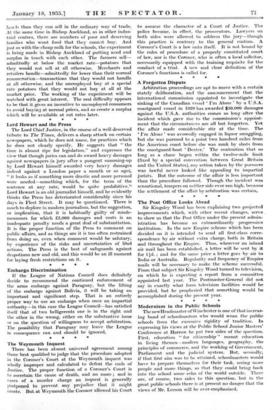Lord Hewart and the Press The Lord Chief Justice, in
the course of a well-deserved tribute to The Times, delivers a sharp attack on certain newspapers, which he does not name, for practices which he does not clearly specify. He suggests that " the time is almost ripe for legislation," and expresses the view that though juries can and do award heavy damages against newspapers (a jury after a pungent summing-up by Lord Hewart himself awarded very heavy damages indeed against a London paper a month or so ago), " it looks as if something more drastic and more personal were needed—something which, for the term of the sentence at any rate, would be quite prohibitive." Lord Hewart is an old journalist himself, and he evidently thinks the Press has deteriorated considerably since his days in. Fleet Street. It may be questioned. There is much to deplore in modern journalism, but the suggestion, or implication, that it is habitually guilty of misde- meanours for which £5,000 damages and costs is an inadequate penalty needs a great deal of substantiation. It is the proper function of the Press to comment on public affairs, and as things are it is too often restrained from doing so, even when comment would be salutary, by experience of the risks and uncertainties of libel actions. The Press is the best of safeguards against despotisms new and old, and this would be an ill moment for laying fresh restrictions on it.
* *






































 Previous page
Previous page